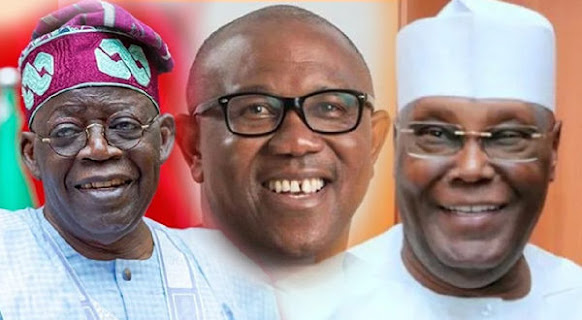 |
| Millions of Nigerians vote in tightest-ever poll. |
Millions of Nigerians are due to vote in the most competitive
presidential election since military rule ended.
Since 1999, Africa’s most populous country has been dominated by
two parties; the ruling APC and the PDP.
But this time, there is also a strong challenge from a third-party
candidate; the Labour Party’s Peter Obi, who is backed by many young people.
Current President Muhammadu Buhari is stepping aside after serving
two four-year terms.
His All Progressives Congress (APC) is represented by former Lagos
governor Bola Tinubu, while former Vice-President Atiku Abubakar is standing
for the main opposition Peoples Democratic Party (PDP). There are a total of 18
presidential candidates.
The lead-up to the polls has been overshadowed by a cash shortage
caused by a botched attempt to redesign the currency, leading to widespread
chaos at banks and cash machines as desperate people sought access to their
money.
The new notes were introduced in order to tackle inflation, and
also vote-buying. On the eve of the election a member of the House of
Representatives was arrested with almost $500,000 (£419,000) in cash, and a
list of people he was supposed to give it to, police say.
Whoever wins will have to deal with the currency redesign, a
crumbling economy, high youth unemployment, and widespread insecurity which saw
10,000 killed last year.
After the killing of a senatorial candidate on Wednesday by
suspected gunmen from the separatist group, Ipob, the parliamentary election was
postponed in the south-eastern Enugu East constituency.
The election has seen a huge interest from first-time voters and
young people – a third of the 87 million eligible voters are below 35 – which
may lead to a high voter turn-out than the 35% recorded in 2019.
“It is my responsibility and I have seen how important it is to
vote,” 19-year-old first-time-voter Blessing Ememumodak told the BBC in Lagos.
Mr Obi, 61, is hoping to break up Nigeria’s two-party system after
joining the Labour Party last May.
Although he was in the PDP before then, he is seen as a relatively
fresh face and enjoys fervent support among some sections of Nigeria’s youth,
especially in the south.
The wealthy businessman served as governor of the south-eastern
Anambra State from 2006 to 2014. His backers, known as the “OBIdients” say he
is the only candidate with integrity, but his critics argue that a vote for Obi
is wasted as he is unlikely to win.
Who is Peter Obi?
Instead, the PDP, which ruled until 2015, wants Nigerians to vote
for Atiku Abubakar, 76 – the only major candidate from the country’s mainly
Muslim north.
He has run for the presidency five times before – all of which he
has lost. He has been dogged by accusations of corruption and cronyism, which
he denies.
Most of his career has been spent in the corridors of power,
having worked as a top civil servant, vice-president and a prominent
businessman.
Who is Atiku Abubakar?
Most people consider the election a referendum on the APC, which
has overseen a period of economic hardship and worsening insecurity.
Its candidate, Bola Ahmed Tinubu, 70, is credited with building
Nigeria’s commercial hub Lagos, during his two terms as governor until 2007.
He is known as a political godfather in the south-west region,
where he wields huge influence, but like Mr Abubakar, has also been dogged by
allegations of corruption over the years and poor health, both of which he
denies.
Voting is expected to begin at 08:30 local time (07:30 GMT),
though anyone in the queue before it ends at 14:30 will be allowed to vote.
Elections are also being held for 109 federal senators and 360
members of the house of representatives, with that for governors holding in
March.
The Independent National Electoral Commission (Inec) has promised
free and fair elections, and has dismissed talk of postponement amid fears of
insecurity in parts of the country and the cash shortage that many feared might
affect its preparations.
It is the first time Inec will conduct national elections using
the Bimodal Voter Accreditation System (BVAS), a facial and fingerprints
technology that is thought to improve transparency by making it harder for
politicians to rig the process.
Final results have been announced on the third day after voting in
the last two elections, but they may come in earlier this time because of BVAS,
which also uploads vote results directly to the Inec website direct from
polling stations.
A candidate needs to have the most votes and 25% of ballots cast
in two-thirds of Nigeria’s 36 states to be declared the winner
If no-one achieves that, there will be a run-off within 21 days –
a first in Nigeria’s history.
Also Watch:
Nigeria 2023 Presidential Election LIVESTREAM.
Also Read: International News Millions of Nigerians vote in tightest-ever poll. HR Forum Media February 26, 2023 Millions of …
Read moreSource: BBC | Host: HR Forum News





.jpeg)


0 Comments